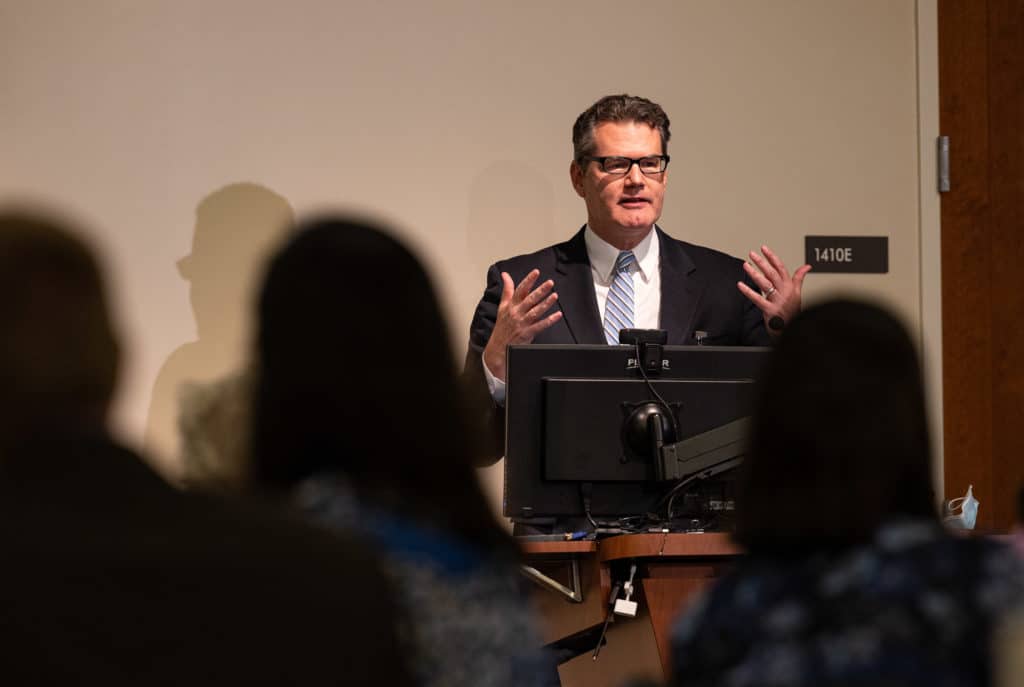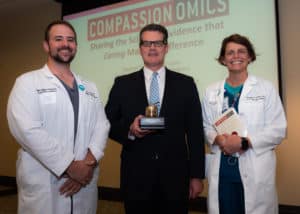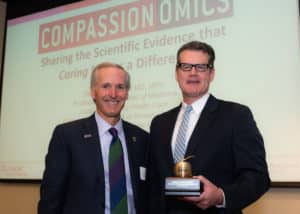Burnout in health care providers is not a new concept but ideas and theories of how to avoid it are developing in unique ways.
Dr. Stephen Trzeciak served as the featured lecturer for the 13th annual José G. Albernaz Golden Apple Distinguished Lecture presented by ECU Medical & Health Sciences Foundation and Vidant Health. Dr. Trzeciak, chief of medicine at Cooper University Health Care and professor and chair of medicine at Cooper Medical School of Rowan University in Camden, New Jersey, discussed compassion and the importance of meaningful connections in health care and everyday life.

A few years ago, Dr. Trzeciak was facing burnout as a health care provider and knew something needed to change.
As a person who loves research, he began to dig into related literature and studies that focused on combating burnout in providers. In medical school, he said, he was taught that caring too much and having too much compassion could cause a provider burnout more quickly. What he found in studies, however, painted a different picture.
“What the literature shows is that there is an association with compassion and burnout – but it’s inverse. If there’s high compassion, there’s low burnout. Why? Well, we don’t know for sure but I have my hypothesis,” Dr. Trzeciak said. “Because when you connect with people through compassion, and have a relationship that flows from that, you get the fulfilling part. If you don’t have that then all you have is a really stressful job.”
Key to Resilience is Relationships

He tested his hypothesis on himself, as a study subject of one and found that when he leaned into caring more rather than detaching, his feelings of burnout began to lift. It wasn’t just about connecting with and showing compassion to patients and families, but to everyone he worked with and interacted with—professionally and personally. He believes this method can work not only within health care but in every walk of life.
He challenged everyone who is feeling the effects of burnout to give his method a chance, not just because it has worked for him and helped change his life, but because it is backed by science.
He highlighted a Harvard University study that tracked students at the university and Boston-area teenagers throughout their lives and found the best predictor of good health and well-being into your 80’s is your midlife quality of relationships. Dr. Trzeciak said this and many other studies show that the key to resilience is relationships.
“That’s why it is vitally important in our health systems, in our medical schools, everywhere – at the shopping mall, at the grocery store – that we take good care of each other,” Dr. Trzeciak said. “You don’t have to be a health care provider to feel burnout, especially in 2021.”
Compassion in Health Care
Compassionate and caring environments not only help team members face less burnout, but also help patients see better outcomes.
During his lecture, Dr. Trzeciak discussed many studies pointing to positive results for patients whose health care providers show compassion in various ways. He said that he does not have any magical thinking about compassion and that the top determinant of clinical outcome is still clinical excellence.
However, he said no patient and no provider should have to choose between clinical excellence and compassionate care. It’s not an either-or choice, but a both-and.
In eastern North Carolina
 Dr. Michael Waldrum, chief executive officer of Vidant and dean of the Brody School of Medicine, said it was no mistake that Vidant chose compassion as one of its core values six years ago—a thoughtful selection rooted in understanding what behaviors help patients, the communities Vidant serves and team members.
Dr. Michael Waldrum, chief executive officer of Vidant and dean of the Brody School of Medicine, said it was no mistake that Vidant chose compassion as one of its core values six years ago—a thoughtful selection rooted in understanding what behaviors help patients, the communities Vidant serves and team members.
“As I think about that time and the now the world we live in today, with the most profound social and health care disruptions, with more Americans that died in any event in over 102 years… at no time is compassion more important than right now,” Dr. Waldrum said. “That is a really hard thing to deal with, those realities. The great thing is that we know we have solutions to the challenges we face and compassion is one of those solutions.”
Typically, the José G. Albernaz Golden Apple Distinguished Lecture is set for the first day of class for first-year Brody School of Medicine students. However, due to the COVID-19 pandemic, the event was held for a smaller audience with a few representatives from the first-year Brody class.
Dr. Waldrum said during the event that he recently had dinner with a group of first-year Brody students who discussed the need to bring greater compassion to health care.
“It was so impactful to me because I left that meeting last night and I’m just so proud to be in eastern North Carolina and having that dialogue and making compassion cool,” Dr. Waldrum said. “Because I think that’s what it takes. It takes intention in talking about it, understanding it and knowing we’ll never be perfect, but we’re all on this journey.”